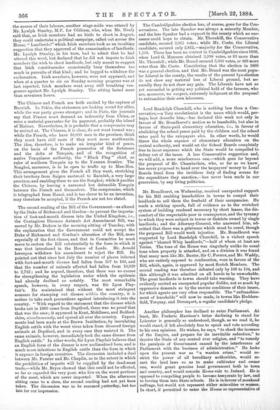The second reading of the Bill of the Government—as altered
by the Duke of Richmond and Gordon—to prevent the importa- tion of foot-and-mouth disease into the United Kingdom, i.e., the Contagious Diseases Animals Act Amendment Bill, was moved by Mr. Dodson in the morning sitting of Tuesday, with the explanation that the Government could not accept the Duke of Richmond and Gordon's alteration of the Bill, more especially of the first clause, and that in Committee be must move to restore the Bill substantially to the form in which it was first introduced in the House of Lords. Mr. Arnold hereupon withdrew his amendment to reject the Bill. He pointed out that since last July the number of places infected with foot-and-mouth disease had fallen from 307 to 166, and that the number of animals affected had fallen from 10,939 to 2,742; and he argued, therefore, that there was no excuse for strengthening the legislation under which the epidemic had already declined so notably. The most remarkable speech, however, in every respect, was Sir Lyon Play. fair's He maintained that without the most stringent measure for stamping out disease within the country, it is useless to take such precautions against introducing it into the country. "With regard to the statement that the disease which broke out in 1880 came from Deptford, there was no proof that that was the case; it appeared in Kent, Middlesex, and Bedford- shire, simultaneously, and spread all over the country. Experi- ments had been made at the Brown Institution, by inoculating English cattle with the worst virus taken from diseased foreign animals at Deptford, and in every case they resisted it. The same animals, however, immediately took the same disease from English cattle." In other words, Sir Lyon Playfair believes that an English form of the disease is now acclimatised here, and is much more infectious to English cattle than the form in which it appears in foreign countries. The discussion included a duel between Mr. Forster and Mr. Chaplin, as to the extent in-which the prohibition of imports will be supplied by the dead-meat trade,—while Mr. Bryce showed that this could not be-effected, so far as regarded the very poor, who live on the worst portions of the meat, which are never imported. When the afternoon sitting came to a close, the second reading had not yet been taken. The discussion was to be resumed yesterday, but too late for our impression.


































 Previous page
Previous page